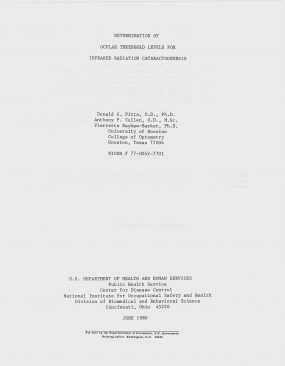Determination of Ocular Threshold Levels for Infrared Radiation Cataractogenesis
June 1980
DHHS (NIOSH) Publication Number 80-121

The effects of infrared radiation on rabbit and monkey eyes were tested to establish the ocular threshold exposure values for radiation in the 700 to 1400 nanometers (nm) wavelength range necessary to produce cateracts in the crystalline lenses. A 5000 watt lamp was used as the source for the infrared energy. Corneal, iris and lenticular lesions resulted from irradiation. Corneal damage varied from epithelial haze to erosion and healed within 24 hours. The iris showed stromal haze and swelling in the exposure region with severe damage. Lenticular 0pacities appeared as small white dots at the level of the anterior epithelium beneath the anterior capsule. The radiant exposure threshold decreased as the irradiance level increased. In rabbits irradiance exceeding 4.0 watts per square centimeter (W/sq cm) resulted in threshold radiant exposure of 1250 joules per square centimeter (J/sq cm) for the corneas, 1250 J/sq cm for the iris and 2250 J/sq cm for the lens. In the primate, irradiance above 4.0W/sq cm resulted in radiant exposure thresholds of 8000 J/sq cm for the cornea and iris and 10,000 J/sq cm for the lens. The authors recommend reflective metallic coatings to control occular exposure to infrared radiation.
Determination of Ocular Threshold Levels for Infrared Radiation Cataractogenesis [PDF – 18 MB]
- Page last reviewed: April 3, 2017
- Page last updated: June 16, 2017
- Content source:
- National Institute for Occupational Safety and Health Education and Information Division


 ShareCompartir
ShareCompartir